11 de mayo 2020

Children of Exile: The Births “Sowing Hope” in the Camp of Nicaraguan Farmers

PUBLICIDAD 1M
PUBLICIDAD 4D
PUBLICIDAD 5D
More than 1.5 million underemployed Nicaraguans struggle to make it during the Covid-19 pandemic
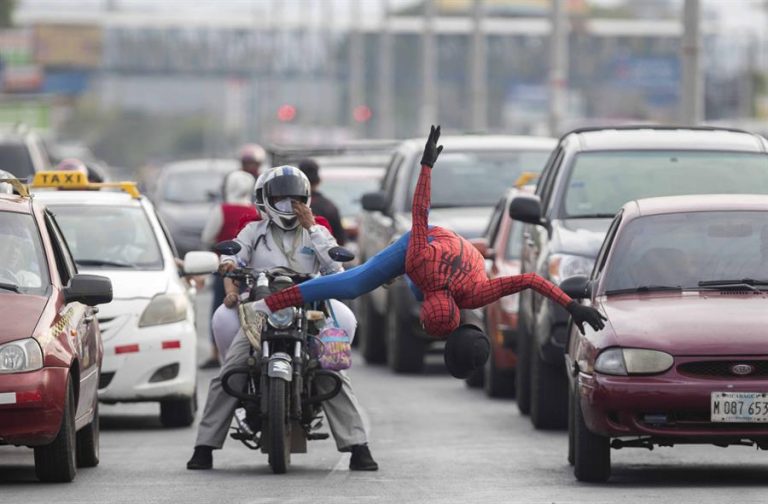
Each week, from Monday through Friday, Spiderman jumps from the corner of a traffic light in Managua to help maintain his household’s economy. As a good superhero he looks healthy and athletic, but the Covid-19 pandemic prevents him from being consistent in his feat of “bringing home the bread”.
Together with a suitless Venom, Spiderman makes a living by performing under a traffic light as a street dancer, in the midst of window cleaners and vendors, who are part of an army of more than 1.5 million underemployed in Nicaragua, according to official data.
In the sun or rain, Spiderman and Venom are fighting a never-ending duel, which at best will make them around US $7 at the end of a good day, or just a penny if they were not so lucky.
“There are good and bad days, I save the little I earn and when I can, I help out my mother”, says Steven Garmendia from inside his Spiderman suit, his favorite superhero.
Without Spiderman’s superpowers or skyscrapers to show it, young Garmendia looks like Peter Parker in his everyday life, with his tall pompadour hair and thin eyeglasses, yet the real resemblance is achieved by his shyness, for out of respect for his mother, who does not agree with him dancing in public or earning money by passing the hat around, he refuses to show his face and talk in front of the camera.
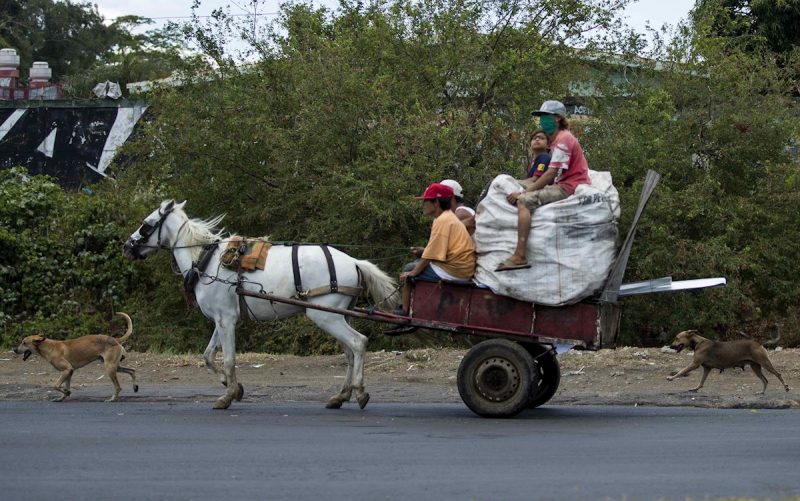
A young metal scrap collector rides with a mask on a horse-drawn cart in Managua. Photo: EFE
Venom beats him on this, Diedrich Díaz, 24 years-old, one of more than 400,000 Nicaraguans who lost their jobs after the socio-political crisis of 2018. Finding himself without options he thought of making money by doing what they both love, street dancing, but recognizes that in the midst of the pandemic it is more difficult.
“In fact, there are weeks that only three or four cars are at the light”, says Díaz who believes that wearing masks during the performance inspires the same fear among people as would a criminal.
“It has been very hard, since people see us like this without protection or anything and they are afraid to open the car window to give us something, and if they give us something they throw us the coin, or else they let it fall into our hands, but yes, it’s been hard,” he says.
Spiderman and Venom say they are afraid of getting Covid-19, but insist that they cannot stay home because otherwise they will have no money to support themselves, and will become part of the more than 600,000 people who are feared to lose their jobs in Nicaragua by the end of 2020.
The situation of the underemployed is what President Daniel Ortega claims to be defending, stating that he cannot establish measures to contain the spread of the pandemic, because that would mean stopping the country’s economy, 75% of which is based on the informal sector, according to business sources.
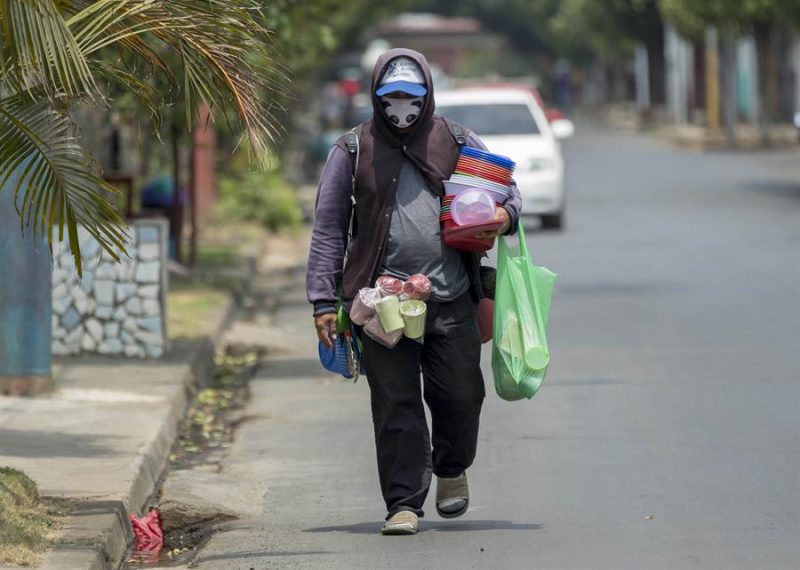
A street vendor using a mask as a preventive measure against coronavirus in Managua. Photo: EFE | Jorge Torres
However, the greatest fear of these young men is the lack of information, since the information provided by the government, which is scarce and confusing, limits prevention, causes fear and reduces their earnings.
“The situation is becoming more critical and there isn’t enough information about the virus on social media or television that we know of”, says Diaz.
The Health Ministry has only reported 16 cases of the new coronavirus, including five deaths, but the independent Citizen Observatory Covid-19, reports 781 cases with 88 deaths due to the pandemic.
The government’s handling of information about the SARS-coV-2 coronavirus is similar to other aspects of public life that are controlled in Nicaragua, and which has led to dissidents accusing Ortega of being a dictator.
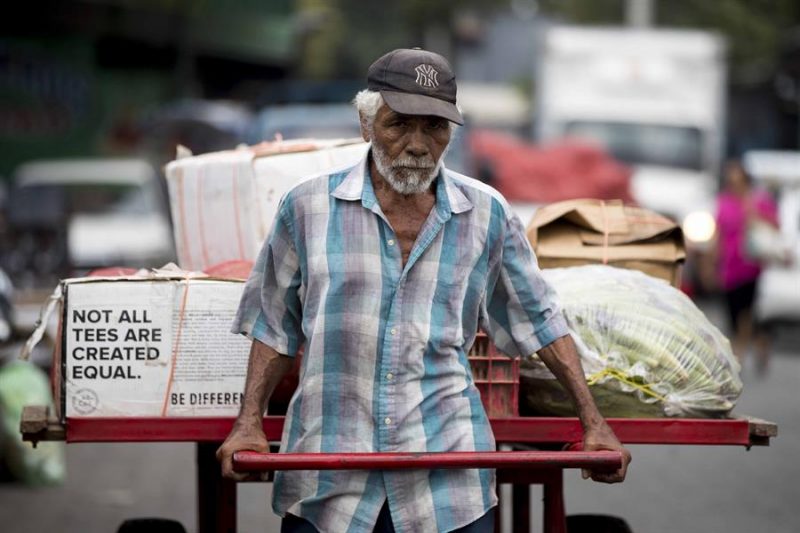
A man works loading and transporting merchandise at a market in Managua. Photo: Jorge Torres / EFE
This control caused another “superhero” to decline talking with EFE, because the one time he gave an interview he was thrown out of the traffic light by authorities, and it took him years to make his reappearance at another location.
To make money independently amid this pandemic is especially difficult in a country where 58.5% of its 6.3 million inhabitants live in poverty, and 29.5% in indigence, according to data from the Central American Integration System (SICA).
The future does not look rosy for the underemployed, as experts have warned that Nicaragua’s economic recession will soon turn into a depression, and this time the authorities have not stepped up to deny it.
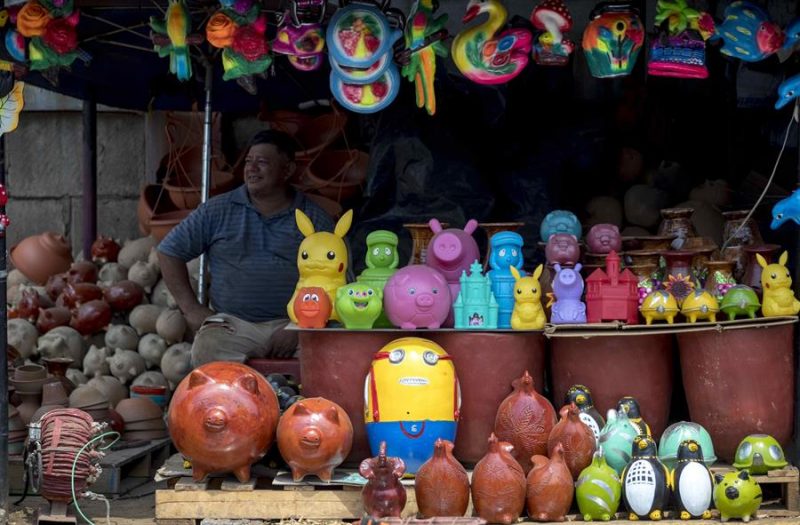
A man sells ceramic handicrafts at a market in Managua. Photo: Jorge Torres / EFE
The Nicaraguan government expected gross domestic product (GDP) to show a slight growth of 0.5% in 2020, after falling -4% in 2018 and -3,9% in 2019, however the International Monetary Fund (IMF) and the Economic Commission for Latin America and the Caribbean (ECLAC) have forecast decreases of between -6% and -5.9%, while the non-governmental Nicaraguan Foundation for Economic and Social Development (Funides) estimates up to -13.7%.
In other words, Garmendia and Díaz will see fewer and fewer cars at the traffic lights and will have a hard time keeping with their university English courses.
With these numbers, Spiderman, Venom, and the army of 1.5 million underemployed Nicaraguans are facing Covid-19 in the worst scenario, that of the menace of extreme poverty.
PUBLICIDAD 3M
Agencia de noticias internacional con sede en Madrid, España. Fundada en Burgos durante la guerra civil española en enero de 1939.
PUBLICIDAD 3D